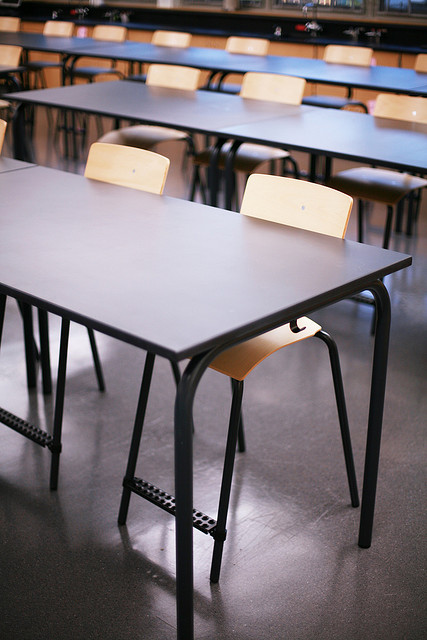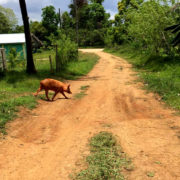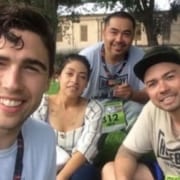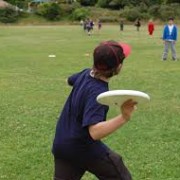Jesuit Volunteer Reflects: Stay at the Table

“As I taught and graduated my final class of 17 students, I realized how disconnected I felt from them. This past month, I primarily worked with eight active teenage students who enjoyed laughing and talking to one another during topics. Several students walked around the classroom instead of staying in their seats.” Photo Credit: Flickr//binw.marketing
BY SARAH ESTRADA | July 10, 2015
One of my responsibilities at my JVC Placement, Northside CYO, is facilitating our Refugee Youth Academy Program. This program provides a transitional class for newly arrived refugee youth to learn more about the structure of public schools in the United States. Each month, I receive a new list of students who come from different countries, speak more than one language, and have varying previous educational backgrounds. We practice topics including the alphabet, telling time, how to organize a school schedule, and greetings. From teaching a class of 10 kindergarteners in December, to teaching a family of 4 siblings in February, I’m challenged, each month, to fully engage with the youth and meet students where they are at in order to adapt the formatted curricula to the skill level, interest, and personalities of the participants.
As I taught and graduated my final class of 17 students, I realized how disconnected I felt from them. This past month, I primarily worked with eight active teenage students who enjoyed laughing and talking to one another during topics. Several students walked around the classroom instead of staying in their seats.
By the third week I would hear them talking to one another instead of listening to the lesson, and I began to feel unmotivated. As I handed out their certificates of completion, I did not feel like I fully invested in these students. I felt as if I had done these students a disservice; that I didn’t do my job as a teacher or educational facilitator and, potentially, left my students unprepared for what is to come in the public school system.
This sense of dissatisfaction with my work performance also stems from realizing that August is quickly approaching and my JV year is coming to an end. On top of teaching a rambunctious group of students, I am trying to organize a 6-week long recreational and educational summer program for my agency, pack and ship my belongings, deal with family issues back home, pay off a parking ticket, and fulfill the end-of-the-year responsibilities in our community.
With the amount of work in front of me, it’s been difficult to feel the ground beneath my feet. It’s hard to stay committed to my responsibilities both at my agency and in my community. It’s hard to feel a part of a conflicted community. It’s not easy to live in dissatisfaction with myself. In such an environment, I lose sight of why I am in JVC and what I dedicated my year to doing.
Recently, I started going back to church, not just to pray, but to start finding environments where I can ground myself again. Although I find myself dozing off during the homily or getting up to go to the restroom because I drank too much water prior to the service, there’s something about being in the presence of a higher power that calms me. In one of the services I attend, I am one of the youngest in the congregation. Whenever I walk into the space, I receive stares by the older women who walk into the church together with coordinated pastel clothing and then disperse into specific places amongst the pews.
At the end of one service, I held the door for one of the women who stares at me. Although I contemplated letting it go in front of her, I held the door open anyways. As she walked through, she held the door open with one hand and as I let go of my hand, she looked me in the eye and said, “Thank you, dear” with a smile. And in that moment, I, too, smiled.
That small interaction surprised me. I did not know this woman who stares at me and yet I judged her and characterized an identity for her based on how she made me feel. I did not want to hold the door open for this woman, and yet I did. I did not even want to go to church that day. And yet, in a simple way, I felt grace.
It’s easy to feel discouraged and to give up on goals, or even give up on myself, when the results I desire aren’t manifested in reality. It’s also simple to put the blame on another person, action, or situation. It’s effortless to let go of a door, and for someone else to open it for themselves. But it’s during that split-second of recognizing the presence of another, and being in that moment with them, that common ground is established and a table, or a shared space, has been created.
“With a month and a half left in my year, and my inherent wandering and worrying mind, I’m trying to stay at the table.”
I am still working on grounding myself. I am trying to prioritize personal time and finding spaces and relationships to help foster such development. I am retracing my steps; looking back at the footsteps I’ve made and the imprints made by others on my JV journey. I am also trying to meet my current responsibilities as an employee, teacher, daughter, friend, community member, and JV. With a month and a half left in my year, and my inherent wandering and worrying mind, I’m trying to stay at the table. I have hope in the foundation that has been created over the last 10 months of my JV experience. I’ve learned that it is through God, finding grace in and through others, looking others in the eye, and holding open the door that I am able to ground myself.
Sarah Estrada is from San Jose, California. She is a graduate of the University of San Francisco with a BA in International Studies and a minor in Philippine Studies. Sarah enjoys watching TV, especially the news, learning new styles of dance, and learning new things. She loves doing chores and loves to travel, even though she is a homebody at heart. As a JV, she serves in Syracuse, NY as a Refugee Youth Program Coordinator at Catholic Charities of Onondaga/Northside CYO.











Leave a Reply
Want to join the discussion?Feel free to contribute!